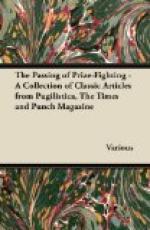Her Father. Pamela doesn’t get accustomed—she criticises. If it weren’t for a silly tail here, a stupid face there, her critical faculty might lie for ever dormant.
Pamela (having turned over four or five pages with one grasp of the hand, as if determined to suppress the unsatisfactory horse). R for Bunny.
Her Mother. No, dear, Rabbit. R for Rabbit. B for Bunny.
Pamela (gently). No; B is for Dicky. The ugly dicky wiv the blue mouf.
Her Father (rashly). The blackbird.
Pamela (conscious of superior knowledge). That isn’t its name. That’s what it looks like, all black; but its name is Dicky. B for Dicky.
Her Father. Well, have it your own way. What does S stand for?
Pamela (turning to the likeness of an elderly quadruped, with great assurance). Baa-lamb!
Her Father. Sometimes we call baa-lambs sheep.
Pamela. I don’t.
Her Father. You will when you grow older.
Pamela. I won’t be any older, not for ever so long. Not till next birfday. (Pushing her book away and assuming an air of extreme infancy) Tired of reading. Want a piggy-back, please!
Her Father (firmly taking up his review again). Not just now. I’m busy with a picture-book.
[A reproachful silence falls upon the room.
Pamela (presently, in a mournful chant). A for Don-key. B for Dicky—
The Scene closes.
* * * * *
[Illustration: THE PRINCE COMES HOME.]
* * * * *
[Illustration: MORE OUTLINES OF HISTORY.
Sailor. “WE HAVE JUST SEEN SOME ORANGE-PEEL AND BANANA-SKINS FLOATING ON THE STARBOARD, SIR.”
Columbus. “WAS THERE ANY CHEWING-GUM?”
Sailor. “NO, SIR.”
Columbus. “THEN IT MUST BE THE WEST INDIES WE’RE COMING TO, AND I’D HOPED IT WAS GOING TO BE AMERICA.”]
* * * * *
FLOWERS’ NAMES.
CROW’S-FOOT.
Have you noticed that the splendid dreams,
the best dreams that there are,
Come always in the darkest nights without
a single star?
When the moonless nights are blackest
the best dreams are about;
I’ll tell you why that should be
so and how I found it out.
There’s a bird who comes at night-time,
and underneath his wings,
All warm and soft and feathery, lie tiny
fairy things;
He spreads his wings out widely (you see
them, not the dark)
And you hear the fairies whispering, “Hush!
hush!” “I’ll tell you!” “Hark!”
The bird is black and feathery, but his
feet are made of gold;
He chiefly comes in summer-time, for fairies
hate the cold;
And if the nights are velvet-dark and
full of summer airs
He lingers till the sun creeps up and
finds him unawares.




